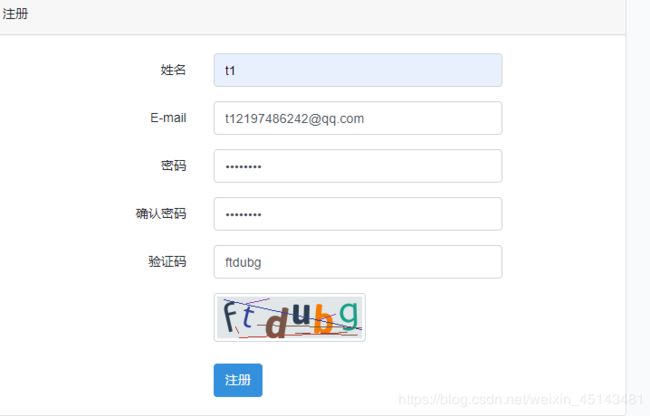laravel邮箱认证
1.首先在UserModel引入邮箱认证相关功能
namespace App\Models;
use Illuminate\Contracts\Auth\MustVerifyEmail as MustVerifyEmailContract;
use Illuminate\Foundation\Auth\User as Authenticatable;
use Illuminate\Notifications\Notifiable;
use Illuminate\Auth\MustVerifyEmail as MustVerifyEmailTrait;
class User extends Authenticatable implements MustVerifyEmailContract
{
use Notifiable, MustVerifyEmailTrait;
protected $fillable = [
'name', 'email', 'password',
];
protected $hidden = [
'password', 'remember_token',
];
protected $casts = [
'email_verified_at' => 'datetime',
];
}
我们修改的User实现了 MustVerifyEmailContract 接口
查看其源码
vendor/laravel/framework/src/illuminate/Contracts/Auth/MustVerifyEmail
namespace Illuminate\Contracts\Auth;
interface MustVerifyEmail
{
/**
* Determine if the user has verified their email address.
*验证用户邮箱是否认证
* @return bool
*/
public function hasVerifiedEmail();
/**
* Mark the given user's email as verified.
*将用户标记为已认证
* @return bool
*/
public function markEmailAsVerified();
/**
* Send the email verification notification.
*发送邮件认证的消息通知
* @return void
*/
public function sendEmailVerificationNotification();
/**
* Get the email address that should be used for verification.
*获取发送邮件地址
* @return string
*/
public function getEmailForVerification();
}
在User内部我们添加了 trait MustVerifyEmailTrait 该trait实现 MustVerifyEmailContract接口
查看其源码
vendor/laravel/framework/src/illuminate/Auth/MustVerifyEmail.php
namespace Illuminate\Auth;
use Illuminate\Auth\Notifications\VerifyEmail;
trait MustVerifyEmail
{
/**
* Determine if the user has verified their email address.
*检查用户邮箱是否认证
* @return bool
*/
public function hasVerifiedEmail()
{
return ! is_null($this->email_verified_at);
}
/**
* Mark the given user's email as verified.
*将用户标记为已认证
* @return bool
*/
public function markEmailAsVerified()
{
return $this->forceFill([
'email_verified_at' => $this->freshTimestamp(),
])->save();
}
/**
* Send the email verification notification.
*发送email认证的消息通知
* @return void
*/
public function sendEmailVerificationNotification()
{
$this->notify(new VerifyEmail);
}
/**
* Get the email address that should be used for verification.
*获取发送邮件地址
* @return string
*/
public function getEmailForVerification()
{
return $this->email;
}
}
我们要实现的功能是用户注册后发送认证邮件,我们查看laravel自带的 RegisterController控制器
app\Http\Controllers\Auth/RegisterController
查看其源码发现加载了 RegistersUsers;
再次找到 RegisterUsers;
vendor/laravel/framework/src/illuminate/Foundation/Auth/RegistersUsers.php
我们主要看 register方法
public function register(Request $request)
{
//判断用户提交数据
$this->validator($request->all())->validate();
//创建用户的同时触发注册成功事件,并传入用户
event(new Registered($user = $this->create($request->all())));
//登录用户
$this->guard()->login($user);
return $this->registered($request, $user)
?: redirect($this->redirectPath());
}
其中event这里很关键,这里手动触发了 Registered 事件并传入了用户
我们可以在
app/Providers/EventServiceProvider.php 看到注册的事件监听器
protected $listen = [
Registered::class => [
SendEmailVerificationNotification::class,
],
];
该监听器的逻辑就是SendEmail…类
我们在次找到 SendEmailVerificationNotification类的源码
vendor/laravel/framework/src/Illuminate/Auth/Listeners/SendEmailVerificationNotification.php
里面就一个handle方法
namespace Illuminate\Auth\Listeners;
use Illuminate\Auth\Events\Registered;
use Illuminate\Contracts\Auth\MustVerifyEmail;
class SendEmailVerificationNotification
{
/**
* Handle the event.
*
* @param \Illuminate\Auth\Events\Registered $event
* @return void
*/
public function handle(Registered $event)
{
if ($event->user instanceof MustVerifyEmail && ! $event->user->hasVerifiedEmail()) {
$event->user->sendEmailVerificationNotification();
}
}
}
该方法 判断user是否继承自 MustVerifyEmail 并且用户邮箱没有认证
如果两个条件都满足则调用发送邮件方法。
源码翻了个遍,相信你应该理解其原理了,接下来我们测试邮件发送功能
在.env 中我们将 MATL_DRIVER=smtp 修改为 log这样邮件会保存到 laravel.log文件中
使用其自带的用户注册逻辑与视图
通过命令
php artisan ui:auth
执行迁移文件
php artisan migrate
访问路由
{项目域名}/register

